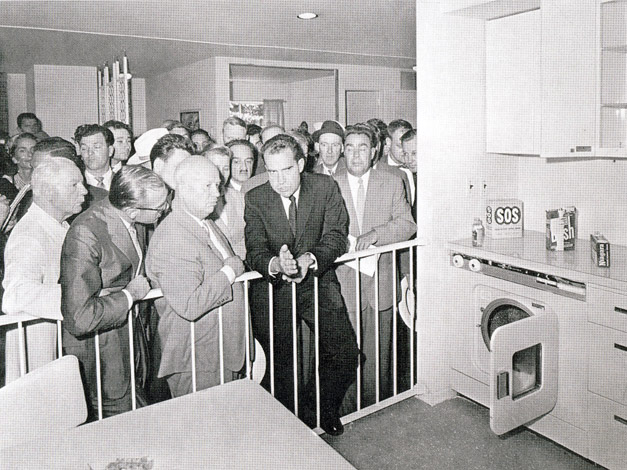
Richard Nixon, U.S. Vice President, and Nikita Khrushchev discuss the marvels of the modern American kitchen on 24 July 1959 at the American National Exhibition in Moscow. For more information, see the Wikipedia entry or The Kitchen Debate. You can also read a transcript of the exchanges between the two world leaders or watch some video on YouTube. See also William Safire, The Cold War's Hot Kitchen (The New York Times, 24 July 2009)
![]()
Before 1945, most Americans did not pay much attention to communism and knew little about Russia. Most American politicians generally regarded communism as the most evil of all things possible in the world; just bad, bad, bad: After all, communists had defaulted on the American loans made to Russia during World War I; communists had expropriated American property (factories and such) and investment in Russia during the Russian Revolution; communists everywhere spoke longingly about causing a worldwide revolution and overthrowing the capitalist world. And most dangerously, communists were very active in America during the depths of the Great Depression of the 1930s (America's "Pink Decade") when it seemed that capitalism had failed. Remember that communists in the Soviet Union had undertaken an enormous economic expansion during the 1930s with the Five-Year Plans to industrialize the country. This was while the Western world's economy stagnated and fell to pieces.
What further aroused US suspicions about communism was the fact that the Soviet Union had signed a treaty with Adolf Hitler in August 1939 (the Molotov-Ribbentrop Pact) that essentially gave Germany a green light to begin World War II--although most Americans did not really understand that connection--and then once the war began in September 1939, the Soviet regime had occupied half of Poland (and annexed Estonia, Latvia and Lithuania) with Hitler's help.
But suddenly, in early 1942, America found itself as an ally of Russian communists, with both the Soviet Union and the United States now partners in the struggle against Germany--interestingly, they were not allies in the struggle against Japan. Suddenly American propaganda had to portray a different image of communists. Hollywood was enlisted to show Americans just how wonderful the communists could be (for example, see the film The North Star, which appeared in 1943, or check out the special edition of Life Magazine from 29 March 1943 with the wonderful picture of Stalin on the cover)--I sold my copy of the magazine, which I had picked up at an old library book sale, on Ebay for a ridiculously low amount--The propaganda blitz continued throughout the war. Russia's fierce and heroic resistance (despite horrendous casualties that eventually reached into the tens of millions) to the entire armed might of Germany further evoked American admiration, especially after the battle of Stalingrad, November 1942 to February 1943.
Then the war ended. By 1945, Americans had become somewhat convinced that maybe those Russian communists were not that bad after all. But by 1949, Americans were again convinced that Russian communists, and communists throughout the world--and they seemed to be everywhere by 1949--were again the incarnation of evil. This was the start of the Cold War.
Jumping ahead a bit time wise
In the viewpoint of many scholars who have studied the Western world, history since 1945 can most easily be seen as a hegemonic contest, winner-take-all struggle, between democracy (representing the free world, the free market and free peoples everywhere), and communism (represented by the Iron Curtain, the planned market and not-so-free peoples everywhere). That sort of the world divided into "two camps" imagery can be traced back to the words of Winston Churchill in 1946.
But then, allegedly with the dismantling of the Berlin Wall in 1989, the reunification of Germany and the elimination of the communist party monopoly of power throughout Eastern and Central Europe and also in Russia--events that all occurred around 1990--democracy has won the battle. (See my remarks on Gorbachev for events in Russia.) That sort of simplistic view of contemporary history--it is so simplistic that I don't want to begin to address it--neglects to recognize the far more important processes that have been taking place in the world since 1945, namely the agricultural, medical, communication, green, and technological revolutions that have taken place. There is also the decolonization process that involved much of the non-developed world (not to mention the worldwide spread of "pop" culture). Indeed, the world today still faces fundamentally-critical problems that affect its future prospects for survival.
References
- Still working on these
- For extra credit please suggest to your instructor a relevant website for this unit of the course. Send the title of the site, the URL and a brief explanation why you find the information interesting and applicable to the material being studied in this unit.